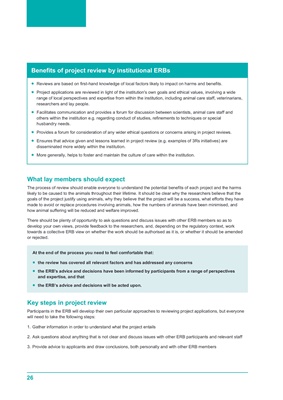
26
What lay members should expect
The process of review should enable everyone to understand the potential benefits of each project and the harms
likely to be caused to the animals throughout their lifetime. It should be clear why the researchers believe that the
goals of the project justify using animals, why they believe that the project will be a success, what efforts they have
made to avoid or replace procedures involving animals, how the numbers of animals have been minimised, and
how animal suffering will be reduced and welfare improved.
There should be plenty of opportunity to ask questions and discuss issues with other ERB members so as to
develop your own views, provide feedback to the researchers, and, depending on the regulatory context, work
towards a collective ERB view on whether the work should be authorised as it is, or whether it should be amended
or rejected.
Key steps in project review
Participants in the ERB will develop their own particular approaches to reviewing project applications, but everyone
will need to take the following steps:
1. Gather information in order to understand what the project entails
2. Ask questions about anything that is not clear and discuss issues with other ERB participants and relevant staff
3. Provide advice to applicants and draw conclusions, both personally and with other ERB members
Benefits of project review by institutional ERBs
Reviews are based on first-hand knowledge of local factors likely to impact on harms and benefits.
Project applications are reviewed in light of the institution's own goals and ethical values, involving a wide
range of local perspectives and expertise from within the institution, including animal care staff, veterinarians,
researchers and lay people.
Facilitates communication and provides a forum for discussion between scientists, animal care staff and
others within the institution e.g. regarding conduct of studies, refinements to techniques or special
husbandry needs.
Provides a forum for consideration of any wider ethical questions or concerns arising in project reviews.
Ensures that advice given and lessons learned in project review (e.g. examples of 3Rs initiatives) are
disseminated more widely within the institution.
More generally, helps to foster and maintain the culture of care within the institution.
At the end of the process you need to feel comfortable that:
the review has covered all relevant factors and has addressed any concerns
the ERB's advice and decisions have been informed by participants from a range of perspectives
and expertise, and that
the ERB"s advice and decisions will be acted upon.